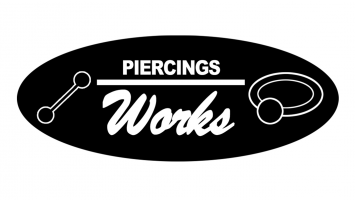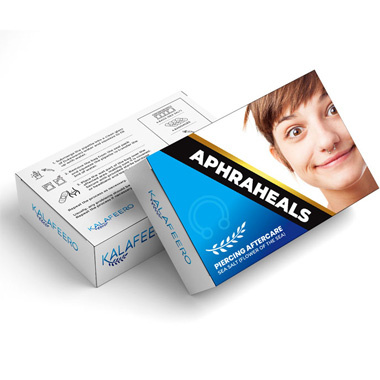1. First off, the experience of the piercer needs to be considered. It’s best not to get pierced at just anybody’s house or have it done by someone who does this as a hobby. Make sure you go to an experienced piercer at a professional studio.
2. A cheap piercing often suggests there is little experience and might also indicate they carry a limited amount of the right equipment. When piercings are very cheap, they are most likely "looking to make a quick buck".
3. The sterilisation process needs to be taken in account as well. The sterilisation agent used by most piercers simply costs more than regular alcohol or any other disinfectant.
4. Does the studio use professional lighting and do they follow hygiene guidelines? Take a moment to consider if you find this a pleasant environment and make sure they keep the place clean. The way a studio is kept will tell you a lot about how they do business.
5. Do they use a sterile pen? A sterile pen is used to mark the intended piercing spot. This is a disposable pen that costs a whopping 3 euros and will only be used once.
6. The tong used by piercers needs to be sterilised. This is done by drying the tong and putting it in a sterilisation bag. Then, the tong will be sterilised in a sterilisation machine. This process takes about 2 hours and you won’t be able to use any equipment before it is completed.
7. The piercing itself needs to be sterilised as well. This can be done by using alcohol but can also be done in the sterilisator. After sterilisation the piercing will have to be sealed and the date noted. The piercing will stay sterile for 6 months until it will have to be sterilised again.
8. It is extremely important that the piercing needle is sterile too.
9. The use of cooling sprays is not uncommon. By using a cooling spray, you will experience less pain while getting your piercing.
10. Sterile placemats are used to place the equipment and piercing on. Make sure your piercer uses these.
11. Often you will find paper on the bench, similar to the paper you find at the doctor’s. It is difficult to remove blood from the bench completely, should you experience any bleeding. Therefore bench paper is not an unnecessary luxury. Take note and make sure bench paper is present.
12. In addition to normally used hygienic gloves, there are latex free gloves. These gloves will cost more but since certain people are allergic to latex, it is a good investment for piercers to make.
13. For some piercings it is advised to cover them with a band-aid when sleeping. Some piercing studios will provide you with a sterile hypoallergenic band-aid. These are significantly more expensive.
14. A piercer should always use titanium jewellery. Titanium will cost up to 10x more that surgical steel. Titanium is much lighter, which allows the piercing to heal faster and contains less nickel than surgical steel (anything under 0,5% is considered nickel-free - titanium contains 0,3 %).
15. Titanium comes in different gradations. In this case, the studio will end up paying more for better quality titanium.
16. Do you get the impression the studio will answer all your questions? Will they take away any concerns or doubts you might have? Good explanation and extensive knowledge are a MUST! Don’t be afraid to ask questions to find out how they go about their business.
17. What are the options for jewellery? Some studios will allow you to choose from different colours or studs while others will only provide a single option.
18. Some piercing studios have good warranties should your piercing grow out. This will allow you to go back and have a new piercing done for free.
19. A piercer’s professional skills and honesty are of vital importance. A good piercer will know and tell you when and if it is impossible to have a certain body part pierced. For example, this might mean you won't be able to have your navel pierced when you are too skinny. When a piercer decides to pierce a part of your body that is too skinny or simply does not leave enough room to be pierced, this can cause a lot of complications.
20. Is your piercing studio environmentally conscious? Do they dispose their needles after piercing? It is possible to collect used needles and hand them in at the GG&GD (the Public Health Service of Amsterdam) so they can be recycled.
21. The Public Health Service (the GG&GD in Amsterdam) regularly inspects tattoo and piercing studios. Make sure the studio you go to has a valid license. Every couple of years these licenses will have to be renewed and the studio will have to pay a fee.
22. It’s nice to be able to go back to your piercer/studio to change your jewellery or when you need aftercare. Make sure that this is possible. This is considered a part of their service and ideally you won’t be charged extra.
23. Make sure your piercing studio is well-informed in case you have a complaint or question. They may be able to contact a doctor to answer your questions.
24. Some studios will mail you additional information and provide a salt solution for aftercare. Others might stay in touch via phone and check in with you to see how things are going after a couple of weeks.
25. Now that we have given you an idea of what is considered when setting prices for the costumer, all these things should be taken into account. We recommend you to look around and do a bit of research in order to make a well-considered decision.
If you want to get a new piercing, it is now possible to schedule your appointment with us! Get pierced when it suits you! You can pay right away, so you don't have to think about it during your appointment.
Aphraheals - Piercing Aftercare



